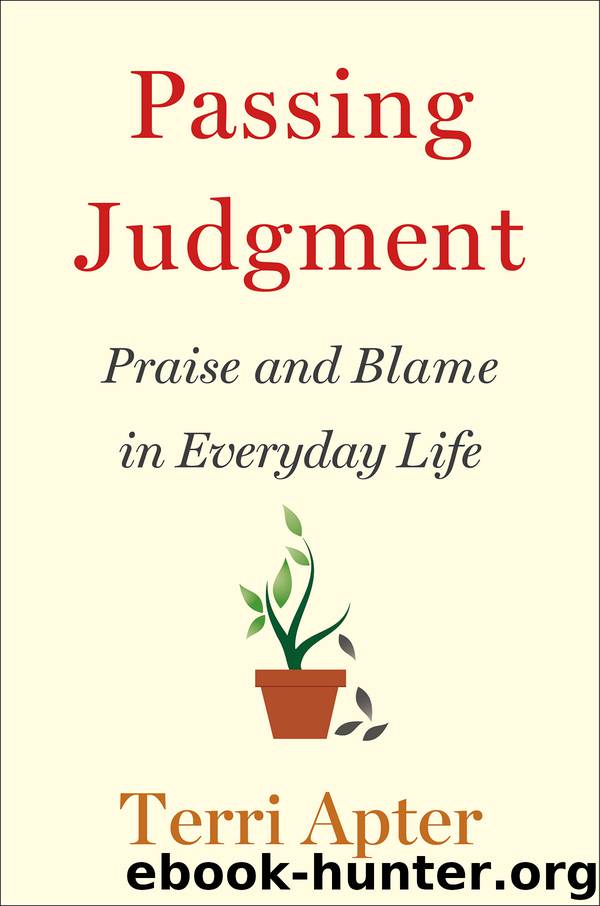Passing Judgment by Terri Apter

Author:Terri Apter
Language: eng
Format: epub
Publisher: W. W. Norton & Company
Published: 2017-04-08T04:00:00+00:00
A Personal View of Workplace Judgments
The academic setting is often referred to as an “ivory tower”—a biblical reference to noble purity.6 The term implies that those who devote themselves to intellectual work are untainted by personal vanities such as praise and blame. For fifteen years I worked in a college as dean 7 of both students and academic staff, while my research took me into the heart of very different workplaces8—a hospital, two schools, a law office, and a large manufacturing corporation. As I gathered my research findings and reflected on my own experiences, I concluded that academia is not a safe haven from ordinary judgments but a rather good place to begin an exploration of praise and blame dynamics in the workplace.
Academics, far from being removed from a personal judgment meter, are obsessed by it. The academic workplace is full of what the psychologist Oliver James calls “office politics” 9 and Ben Dattner calls “the blame game,” 10 whereby people position themselves to be in line for praise, protect themselves from blame, and all too often do their utmost to prevent coworkers from getting praise.
Academics pride themselves—rightly—on nuanced and informed judgments. They appraise the quality of others’ research; they can be obsessed with ranking others’ intelligence; they also assess others’ contributions to the field, carefully monitoring their colleagues’ status. This can be difficult when the gradations are so varied and tiny and the rewards, often, inconsequential. The discrepancies that appear minor to others are magnified within the ivory tower. This follows Sayre’s law, whereby the interest in esteem is inversely proportional to the magnitude of the reward. According to Wallace Stanley Sayre, “Academic politics is the most vicious and bitter form of politics, because the stakes are so low.” 11
Listening was central to my role as dean. I engaged in extensive discussions with academics, both junior and senior, about their careers. Along with other senior college staff, I was struck by how these independent-minded people brooded over others’ judgments of them, their worth, and their work. The brooding cast such a long shadow on morale that a decision was taken to review faculty well-being in the workplace. As part of this review, I noted the themes faculty raised in their discussions with me, and logged the proportion of time devoted to status and esteem anxiety. When staff came to see me, I explained that I would be taking notes, and that, along with the principal and vice-principal, I was looking at areas where people felt dissatisfied at work.12 The records taken over the course of one academic year showed that issues about praise and blame took up approximately 55 percent of the conversation time.
Gemma comes to see me to request a reduction in her teaching stint, but underlying this practical request are issues about praise and blame. Now in her late forties, she believes her research has suffered as a result of her dedicated teaching, yet feels that her teaching contributions are not appreciated: “I find it so discouraging that the excellent teaching I do doesn’t even register in the university’s assessment exercises.
Download
This site does not store any files on its server. We only index and link to content provided by other sites. Please contact the content providers to delete copyright contents if any and email us, we'll remove relevant links or contents immediately.
The Art of Thinking Clearly by Rolf Dobelli(10446)
Mindhunter: Inside the FBI's Elite Serial Crime Unit by John E. Douglas & Mark Olshaker(9313)
Change Your Questions, Change Your Life by Marilee Adams(7754)
Nudge - Improving Decisions about Health, Wealth, and Happiness by Thaler Sunstein(7689)
Mastermind: How to Think Like Sherlock Holmes by Maria Konnikova(7315)
The Power of Now: A Guide to Spiritual Enlightenment by Eckhart Tolle(5745)
Men In Love by Nancy Friday(5232)
Altered Sensations by David Pantalony(5093)
Factfulness: Ten Reasons We're Wrong About the World – and Why Things Are Better Than You Think by Hans Rosling(4730)
The Confidence Code by Katty Kay(4250)
Thinking in Bets by Annie Duke(4216)
Man and His Symbols by Carl Gustav Jung(4127)
The Worm at the Core by Sheldon Solomon(3483)
Why Buddhism is True by Robert Wright(3446)
Liar's Poker by Michael Lewis(3440)
Three Women by Lisa Taddeo(3421)
The Inner Life of Animals by Peter Wohlleben(3303)
Descartes' Error by Antonio Damasio(3270)
How Music Works by David Byrne(3257)
